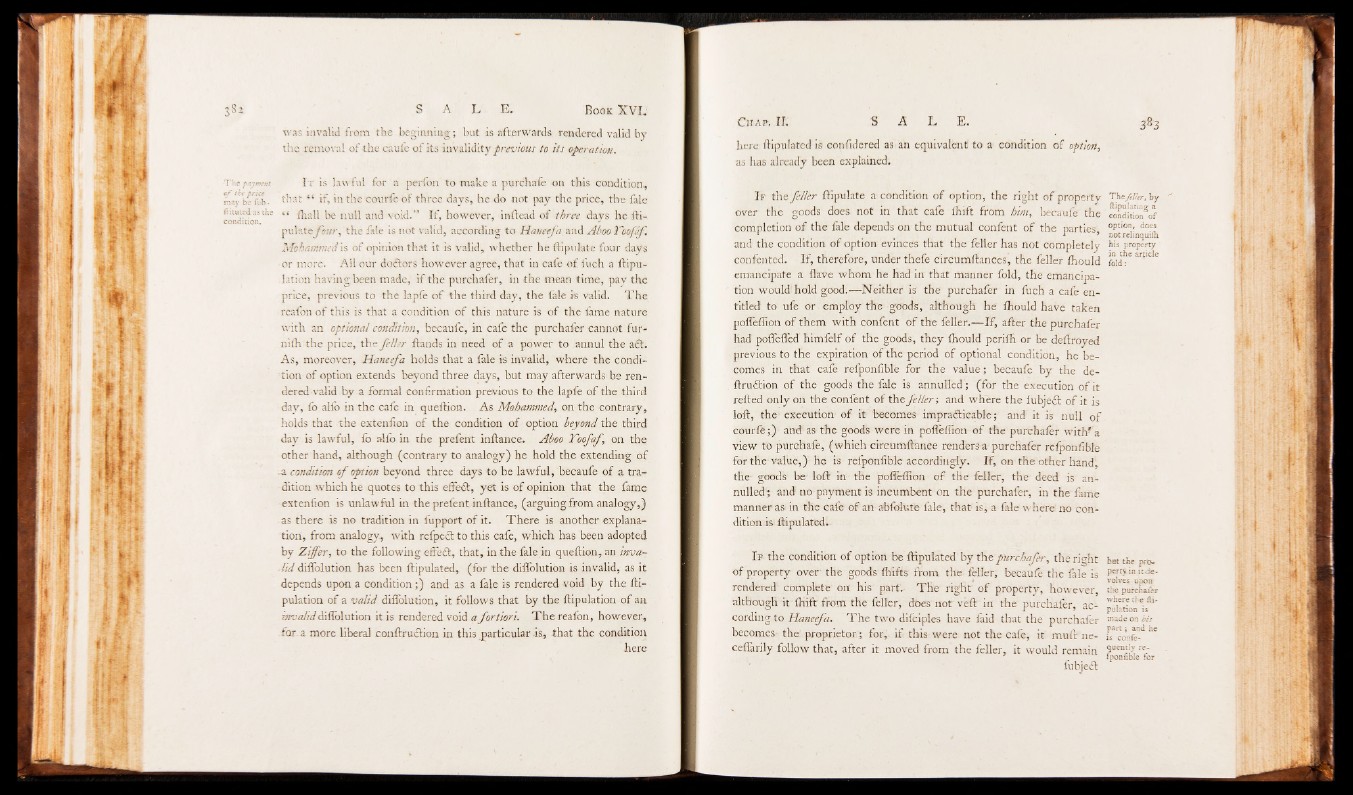
l l l l
i |
3 S i S A L E . Book XVI.
was invalid from the beginning; but is afterwards rendered valid by
the removal of the caufe of its invalidity previous to its operation.
•The I t is lawful for a perfon to make a purchafe 011 this condition,
imy be fab. that “ if, in the courfe of three days, he do not pay the price, the fale
limited as the n foau be lluq and void.” If, however, inftead of three davs he fti-
pulate four, the fale is not valid, according to Haueefa. and Aboo l"oofif.
Mohammed is of opinion that it is valid, whether he Stipulate four days
or more. AH our doctors however agree, that in cafe o f inch a ftipu-
lation having, been made, if the purchafer, in the mean time, pay the
price, previous to the lapfe of the third day, the lale is valid. The
reafon of this is that a condition of this nature is of the fame nature
with an optional condition, becaufe, in cafe the purchafer cannot fur-
nifti the price, the feller Hands in need of a power to annul the a£t.
As, moreover, Haneefa holds that a fale is invalid, where the condition
of option extends beyond three days, but may afterwards1 be rendered
valid by a formal confirmation previous to the lapfe of the, third
day, fo alfo in the cafe in queftion. As Mohammed, on the contrary,
holds that the extenfion of the condition of option beyond the third
day is lawful, fo alfo in the prefent inftance. Aboo Toofsf, on the
other hand, although (contrary to analogy) he hold the extending of
-a condition o f option beyond three days to be lawful, becaufe of a tradition
which he quotes to this effedt, yet is of opinion that the fame
extenfion is unlawful in the prefent inftance, (arguingfrom analogy,)
as there is no tradition in fupport of it. There is another explanation,
from analogy, with refpect to this cafe, which has been adopted
by Zijfer, to the following effect, that, in the fale in queftion, an invalid
diffolution has been ftipulated, (for the diflolution is invalid, as it
depends upon a condition;) and as a fale is rendered void by the fti-
pulation of a valid diffolution, it follows that by the ftipulation of aa
invalid diffolution it is rendered void a fortiori. The reafon, however,
for a more liberal conftruction in this particular is, that the condition
here
here ftipulated is confidered as an equivalent to a condition of option,
as has already been explained.
If the feller ftipulate a condition of option, the right of property
over the goods does not in that cafe fhift from him, becaufe the
completion of the fale depends on the mutual confent of the parties,
and the condition of option evinces that the feller has not completely
confented. If, therefore, under thefe circumllances, the feller fhould
emancipate a Have whom he had in that manner fold, the emancipation
would hold good.— Neither is the purchafer in fuch a cafe entitled
to ufe or employ the goods, although he fhould have taken
pofleffion of them with confent of the feller.— If, after the purchafer
had poffeffed himfelf of the goods, they fhould perifli or be deftroyed
previous to the expiration of the period of optional condition, he becomes
in that cafe refponfible for the value; becaufe by the de-
ftruCtion of the goods the fale is annulled; (for the execution of it
refted only on the confent of the feller-, and where the fubjedt of it is
loft, the' execution of it becomes impracticable; and it is null of
courfe;) and*as the goods were in pofleffion of the purchafer with' a
view to purchafe, (whieh circumftance renders-a purchafer refponfible
for the-value,) he is refponfible accordingly. IF, on the other hand
the- goods be- loft in the pofleffion of the feller, the deed is annulled;
and no payment is incumbent on the purchafer, in the fame
manner as. in the cafe of an abfolute fale, that is, a fale where no condition
is ftipulated.
If the condition of option be ftipulated by tht purchafer, therioht
of property over' the goods' fhifts from the feller, becaufe the fale is
rendered' complete on his part. The right of property, however,
although it fhift from the feller, does not veft in the purchafer, according
to Haneefa. The two difciples have faid that the purchafer
becomes- the: proprietor; for, if this were not the cafe, it mull ne-
ceffarily follow that, after it moved from the feller, it would remain
fubjeft
The feller, by
ftipnlatmg a
condition of
option, does
not relinquiih
his property
in the article
fold:
bat the property
in it devolves
upon
the purchafer
where the fti-
puladon is
made on bis
part; and he
is confe-
quently refponfible
for